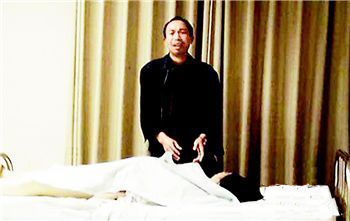The signing of one's name may mean life and death for a patient in danger as doctors need the signature to authorize critical operations. However, one man refused to sign his name and saw his pregnant wife die in the hospital along with a baby in her womb.
The tragedy happened on Wednesday afternoon at the Jingxi branch of Chaoyang Hospital in Beijing. The man, Xiao Zhijun, a migrant worker from central China's Hunan province, unfortunately ignored doctors' repeated urge to sign on an operation notice paper, which would not only give green light to an caesarean operation for his parturient wife, but would also make him pay what he later claimed an apparent big amount of over 5,000 yuan, which he thinks too much for a poor farmer like him.
Following the cruel tug of war over signature urge and refusal, Xiao's poor wife died in the end from heart and lung failure with acute pneumonia and needed caesarean operation to save both her life and that of the baby's. The hospital reported the case to the higher authority and the reply was that "the operation cannot proceed without the permission of Xiao".
Xiao Zhijun talks to reporters at the Jingxi branch of Chaoyang Hospital in Beijing on Thursday, Nov. 22, 2007.
China's regulation on the management of medical institutes in fact stipulates that hospitals must first obtain the nod from the patient as well as receive signed agreement from his or her family members or relatives before they can operate on the patient. In the rare cases when it is impossible to obtain agreement from the patient or when family members or relatives are not present, the doctors must submit their treatment plans to the hospital authority and the higher administration to gain authorization.
A hospital official from the hospital argued, however, that the hospital might face lawsuits and millions of yuan in compensation if they carried out the operation and failed to save lives.
The Beijing Times newspaper reports Friday that Xiao claimed he had sent his wife to the hospital to treat a cold, not for birth delivery. He listed two reasons for his refusal to sign his name. First, he claimed that the doctors killed his wife by pressing on her abdomen. This claim was refuted by the hospital's obstetrics department that explained their doctors were simply massaging below the breastbone of Xiao's wife. Second, he was sending his wife in for a cold only. But he seemed oblivious to others' explanations on how pneumonia might seriously impact the life of a pregnant woman.
The hospital, knowing the woman's life was in severe danger as her conditions rapidly deteriorated, took emergency measures. The ward in which Xiao's wife was accommodated was cleared of other beds to make room for rushed-in medical devices and a 30-plus team of doctors and nurses assembled from across several departments. However, Xiao refused to sign his name even as his wife was gradually losing her breath and her heartbeats almost stopped. His wife died at 7:20 PM and the fetus earlier in her womb.
Xiao Zhijun sits on the stairs inside the Jingxi branch of Chaoyang Hospital in Beijing on Thursday, Nov. 22, 2007.
Xiao, with only 100 yuan in his pocket, first sent his wife to the department of respiration where she was diagnosed with acute pneumonia and the hospital recommended her to be hospitalized, the report says. She was then sent to the obstetrics department where it was decided a caesarean section was a must to save lives. The doctors told Xiao that an operation at that time had a 60 to 70 percent chance of survival for both the mother and the baby. By then, Xiao's wife was already in a coma and Xiao was the only person who could sign and authorize the operation. Some patients in the hospital have even offered to donate him money to cover the operation cost. The report says Xiao denied that he refused to sign due to financial concerns.
A poor dish washer at a Beijing restaurant for 700 yuan a month near the hospital in the western suburb of Beijing, Xiao said he had no savings. The poor man was apparently frightened when he had heard that a caesarean operation would cost more than 5,000 RMB, a gross income amount for about eight months of his hard work.
The Beijing Times interviewed Fu Rui, deputy director of the health bureau of Shijingshan District where the hospital is located. Fu noted the regulation on the management of medical institutes, while offering guarantee to protect the rights of patients and relatives, also limits the rights of doctors to proceed with treatments that might save lives. He suggested that the government should come up with an earlier additional clause to allow doctors, who have the professional know-how, to overrule unwise judgment of relatives in cases of emergency. If not, tragedies like that of the Xiao family will likely be repeated.
There are no further reports whether Xiao would lodge a lawsuit against the hospital who fails to save his pregnant wife even if he declined to sign for an emergency caesarean operation.
Anyhow, what we have to re-think about this time is how the longstanding lofty spirit of "healing the wounded and rescuing the dying" hospitals should follow has lost to the practical yet not fully satisfied regulations on medical operations.
Xiao Zhijun sits by his dead wife.
Xiao Zhijun grieves for his dead wife.
(CRI November 24, 2007)





